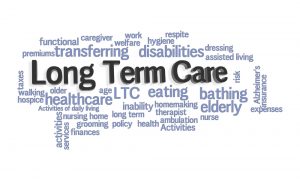Should You Get Long-Term Care Insurance? Read This to Decide!
 What images do talks of retirement bring to mind? Ones of freedom? Extended vacations in your favorite spots? Time for that long-put-off hobby? Often, thoughts on retirement center around the pleasurable expenses. Long-term health costs and their related less-than-ideal circumstances fail to factor into the conversation. Long-term care insurance falls off the radar.
What images do talks of retirement bring to mind? Ones of freedom? Extended vacations in your favorite spots? Time for that long-put-off hobby? Often, thoughts on retirement center around the pleasurable expenses. Long-term health costs and their related less-than-ideal circumstances fail to factor into the conversation. Long-term care insurance falls off the radar.
Furthermore, current health fails to predict the need for long-term care. Unexpected illness or injury, such as a fall, often causes this need to arise. In fact, 70 percent of individuals age 65 today are expected to require long-term care, according to U.S. government estimates. While Medicare covers your treatment for illness or injury, it fails to pay expenses related to daily care in nursing homes and through home health aids.
Long-Term care expenses quickly deplete retirement savings. A semi-private room runs $85,775 yearly with privacy raising the cost to $97,455. For just 44 hours per week of care, you will pay a home health aide, on average, $49,192 yearly. These figures give a significant push to consider long-term care insurance in your retirement planning. But, when is the right time to consider long-term care insurance? The short answer? Now. Let’s look at what this means.
Factors to Consider With Long-Term Care Insurance
Discussing this topic with family, friends, and insurance or financial planning professionals helps you gather valuable insight. The time to begin these conversations is now — before long-term care needs arise. As you consider long-term care insurance, a few factors impact your decision.
Medicaid Rules
When an individual’s savings deplete due to long-term care expenses, Medicaid may be an option. However, know the rules. You need to understand what assets must go to qualify you for this coverage. Plus, long-term care financing plans impact your eligibility. With Medicaid regulations varying by state and changing over time, doing your research becomes imperative. LongTermCare.gov offers an excellent place to start.
Your Family
Talking with family about your long-term care preferences and their involvement puts the future into proper perspective. Family willing to take care of you in your home or theirs help defray future costs. However, work considerations may make home health aide assistance or adult daycare centers (and accompanying insurance needs) a reality. If you do not live near family, the need for long-term care insurance rises.
Your Home
If your future care vision includes staying at home, the layout and structure of your house come into play. Even a stellar home health aide cannot overcome a poor floor plan. Take into account the condition of your home. Can it be modified, if needed, to accommodate changes in your health? Is the budget for those changes factored into your plans? Does the structural integrity of your home indicate this to be a wise move?
Costs
The majority of ongoing care needs fall into the category of extended nursing home stays or non-skilled living assistance. Unfortunately, Medicare does not cover these expenses leaving 55 percent of Americans relying on this coverage without a plan — or lumped with the 50 percent of Americans paying for this care out of pocket. Get a realistic picture of long-term care costs when considering insurance.
Budget
With the rising costs of long-term care and related insurance premiums, tying these costs to your budget is a distinct and primary consideration. Unfortunately, the insurance which supports your ideal long-term care plan may be unaffordable. This truth holds for many Americans. Talking with a financial planner or an insurance agent lays out realistic options given your financial situation. Long-term care calculators also offer insight.
The Right Time to Consider Long-Term Care Insurance
Now is the time to start the conversation. Now is the time to seriously research and consider long-term care insurance. Do not procrastinate believing you have plenty of time. Starting early makes for smart decision-making and adds up to savings.
Start Early for Smart Decision-Making
The earlier you start researching long-term care insurance, the better. Finding the right policy to meet your needs and budget requires time. Contact an insurance expert, do your research and make an informed decision. Needing to decide as circumstances escalate leads to inadequate and often expensive solutions.
Start Early for Savings
Long-term care policy premiums often prove expensive. Starting to shop for long-term care insurance well before you need it saves you money. Purchasing a policy at a young age lowers your premium. However, you must factor in your retirement income and its ability to handle the payments. A “hybrid” insurance policy which includes death benefits and annuities may help as well. However, financial planners prove wary of this option.
Stop Your Procrastination
Now is the time. Today is the day. Research long-term care insurance. Consider your unique situation. Purchase a policy, if that is best. And, mark this weighty task off your to-do list before it becomes a stressor.
Thank you for reading our blog! How can we help you? Contact us today.
Category: Long Term Care Insurance